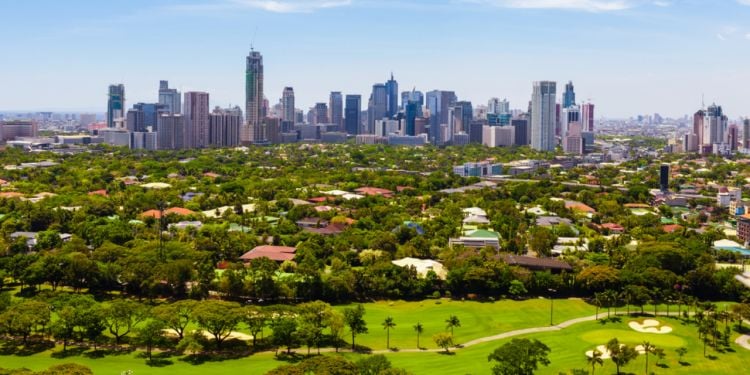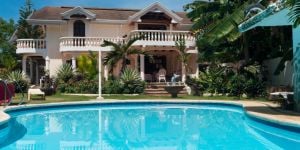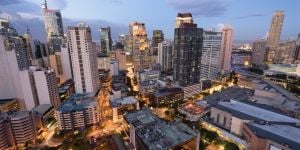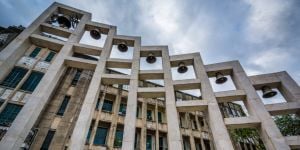
Buying a property is a big and exciting step, but navigating the rules and regulations in a new country can be a daunting task. If you are thinking of moving to Manila, whether it be for work, retirement, or for setting up a business, here's a quick guide to help you choose a property to invest in.
More and more foreigners are now becoming interested in buying properties in Manila because of various factors. The Philippines is a beautiful island nation famous for its warm and friendly people, tropical climate and dreamy white-sand beaches. Compared to its neighboring Southeast Asian countries, it is known as a place of very reasonable cost of living, making it an ideal expat destination.
Popular areas in Manila
The 2023 population of Manila is approximately 14.7 million and Manila is generally referenced to as the metropolitan area, the greater metropolitan area, or Metro Manila.
Manila consists of 16 districts, namely:
Binondo,
Ermita (which is a tourist area),
Intramuros (a fort which was built by the Spanish),
Malate (another tourist area),
Paco,
Pandacan,
Port Area,
Quiapo,
Sampaloc,
San Andres,
San Miguel,
San Nicolas,
Santa Ana,
Santa Cruz,
Santa Mesa
Tondo (known for its slums).
Like most capital cities in the world, Manila can boast about being the country's economic, cultural, educational, religious, and sports hub. Manila is modern, trendy and popular amongst the fashionable, but it does also have immense poverty and crime is rife in the poorer areas.
The more salubrious neighborhoods are Bel Air, Dasmarinas, Magallanes, North and South Forbes, San Lorenzo and Urdaneta, where you are more likely to find stand-alone villas and richer expats and locals living there.
There will be plenty of condominiums in Metro Manila, but the following are said to The top residential areas for expatriates which have many apartments and condos are:
Makati City: the number one recommendation if you choose to live in Manila. This is a very central area where you will be close to the working districts, excellent bars and restaurants. It is a very hip and popular area for millennials. Forbes Park is one of the most exclusive areas in Makati. Makati is also home to the Manila Golf and Country Club and the Manila Polo Club.
Bonifacio Global City (BGC): It is a convenient and safe neighborhood with modern infrastructure and a lively community atmosphere. BGC also has excellent shopping malls, top-class hospitals and international schools. Here you will find expats from around the world, whether young professionals or retirees.
Ortigas Center: With an excellent transportation infrastructure like the MRT (Metro Rail Transit) and buses, it is known for being a safer area than others in Manila. Here also, you will find a large expat community.
Alabang: This area is known for its lower cost of living than others and its excellent transportation. It is very close to the heart of the city and ideal for those with a tighter budget.
Quezon City: It offers access to the north (of Luzon) for getaways, excellent train routes, and plenty of trendy restaurants and condominium options.
The local real estate market in Manila
Like most countries, the real estate market in the Philippines reflects the condition of the economy. The turbulent global economy in the last 20 years has caused property prices to be relatively volatile. Prices fell sharply in the year 2008 to 2009, though it has been on an upward trend since then, with some peaks and troughs along the way. It is important to understand how different areas and property types have been performing in Metro Manila.
The real estate market in Manila post-COVID-19 has some positive signs. Nationwide, the Philippine real estate market has reached an average value of $900 billion USD, which is one of the largest property markets in Southeast Asia. There will be an estimated boost in both the value and the number of residential and commercial properties, with annual growth rates of 0.7% and 2%, respectively, by the end of 2023.
There has been an increase in the construction of high-rise condominium properties sprouting in every corner of Metro Manila, especially near business districts like Makati City, Bonifacio Global City and Ortigas Centre. There are a lot of options available, and each location has its own complexities, so it would be crucial to know the market well and to talk to a local you can trust.
Conditions relating to buying property in Manila
Foreign ownership of property in the Philippines is not absolute and is subject to restrictions. Foreigners may own a real estate property in Manila but are not allowed to buy and own land. This means that expats can own a house but not the land on which it stands. Non-Filipinos may purchase and own condominium units built on Philippine soil. The ownership of condo units is subject to a 40% restriction, which means that the other 60% of condo units in the building must be locally owned.
Condominium projects are similar to corporations in that 60% should be owned by Filipinos. Although it is clear that foreigners are not allowed to own land in the country, these rules are subject to certain exceptions, such as buying land through a corporation. If you want to explore these options, you would have to obtain local legal advice to help you.
House hunting in Manila
It is strongly recommended to use a local property agent that you trust, in finding a property in Manila. Buying a property can be a complicated task, and there's a risk of falling for scams and illegal transactions. The best way to start looking for properties in Manila is through online listings. Some websites to check out houses or condos include:
The best places to buy property in Manila for expats are Ortigas Center, Pasig, Ermita Manila, Eastwood City, Bel-air Village, Legazpi Village, and Bonifacio Global City. Choosing your property will depend on your financial situation, your family status, and if you would prefer an uptown apartment or a suburban house. When picking the perfect location for you in Manila, check out our article about Neighborhoods in Manila.
Procedures for buying real estate in Manila
Here's an outline of steps you can follow when buying a property in Manila as an expat:
Find the right mortgages which might suit you, to get a budget in mind;
Find the property you want to buy using a local sales agent;
Make an offer the seller agrees to;
Create a Deed of Sale contract using a qualified local lawyer. This document consists of the basic terms of the sale, such as purchase price, payment terms and warranties;
Finalize mortgage agreements with the bank and make the agreed deposit payment;
Sign the Deed of Sale contract together with the seller in the presence of a notary;
Register the property transfer using your lawyer, who will register with the Bureau of Internal Revenue, the Registry of Deeds, the Treasurer's Office, and the Assessor's Office,
There are several real estate transaction costs you have to take into consideration as well. Many of these fees are paid by the seller.
If the property is purchased from an Individual:
Capital Gains Tax – 6% of the actual sale price. This is paid by the seller, but in some cases, the buyer might be expected to be the one to pay. This percentage could differ if the property assessed is being used by a business or is a title owned by a corporation, in which case, the rate is 7.5%
Document Stamp Tax – 1.5% of the actual sale price. This is paid by either the buyer or the seller upon agreement. Usually, however, it is the buyer who shoulders the cost.
Transfer Tax – 0.5% of the actual sale price
Registration Fee – 0.25% of the actual sale price
If purchased from a property developer in Manila:
Capital Gains Tax – 10% of the actual sale price. This value might be expressed as part of the sale price.
Document Stamp Tax – 1.5% of the actual sale price
Transfer Tax – 0.5% of the actual sale price
Registration Fee – 0.25% of the actual sale price
Good to know:
Real estate agency fees are paid by the seller and take a cut of around 3 to 5%
Obtaining a mortgage as an expat in Manila
Although every individual application is subject to conditions, the good news is that expats can apply for mortgages through international and national banks in the Philippines. Please be aware that expats can own property, but not the land that it is built on!
Although it has became easier for expats to apply for mortgages in the Philippines, these are only accessible to expats who have the following visas: Quota or Preference Immigrant Visas, Special Resident Retiree Visas, or those with permanent residence status and working visas in some parts of the country. Find out more about visas for the Philippines here.
You can use a broker (which will incur extra fees but can help with the fine details) who will also inform the expat that a 20% deposit is required to initially secure the property.
In conclusion, take your time when buying a property in Manila. Do not fall victim to scams, and make sure everything is above board and legitimate. Use the same due diligence when buying property in Manila that you would use back home.
Useful links:
We do our best to provide accurate and up to date information. However, if you have noticed any inaccuracies in this article, please let us know in the comments section below.








